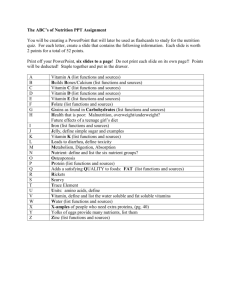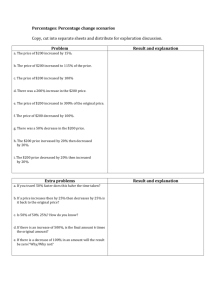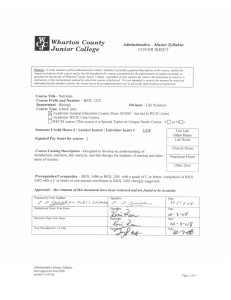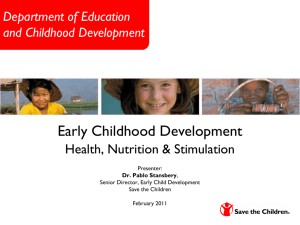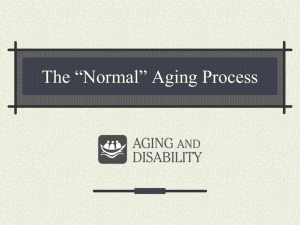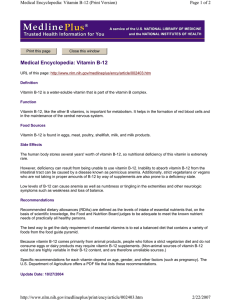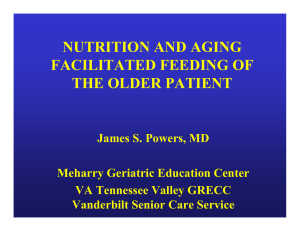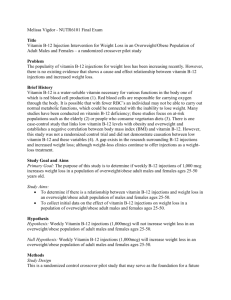functional changes affecting eating & subsequent nutritional status
advertisement
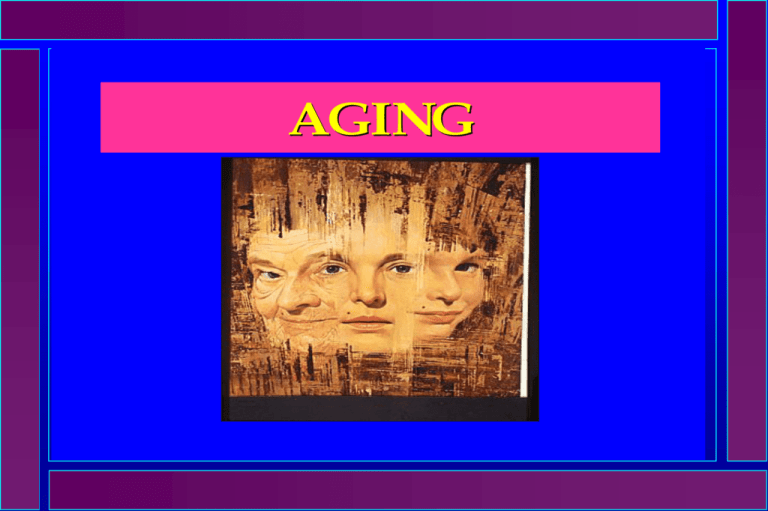
AGING Aging occurs at different rates with different people DO NOT STEREOTYPE !! DIET/NUTRITION AGING GENERAL HEALTH ORAL HEALTH NUTRITION AND AGING aging mechanisms not well understood nutrition influences the aging process. malnutrition increases disease risk good diet may delay chronic diseases. Adequate Nutrition can Improve tolerance and response to treatment improve immune response promote healing reduce complications improve quality of life Types of Changes physiological oral psychological functional AGE-RELATED PHYSIOLOGICAL CHANGES Rate of aging differs with individuals and organs and tissues Progressive decline/changes in many organ systems and associated functions Physiological Changes Increase in Adipose Tissue/Decrease in Lean Body Mass Decrease in Basal Metabolism/Decrease in Calorie Requirement Kidney changes lead to decrease in total body water Physiological Changes Impaired Digestion • lactose intolerance Malabsorption (B-12) Changes in Nutrient Utilization Impaired Elimination • constipation POSSIBLE RESULTS Overt malnutrition Latent malnutrition Laxative Abuse Dehydration Gastrointestinal Disorders Atrophy of gastric mucosa leads to achlorhydria (25% of those over age 60) Result is bacterial overgrowth and malabsorption of protein, calcium, B-12 folic acid and non-heme iron Bowel disease leads to altered motility, constipation, decreased appetite and possibly laxative abuse ORAL CHANGES Decreased Taste & Smell Sensitivity • Atrophy of gustatory papillae leads to decreased taste • Olefaction (smell ability) decreased with age – (Only 32% of 70 year olds can smell as well as young adults) • Many drugs decrease taste and smell Decreased Salivary Function • (xerostomia from drugs) ORAL SOFT TISSUE AND BONE PROBLEMS Impaired Healing or Tissue Fragility (Vitamin deficiencies, e.g., Vitamin C) (Vitamin toxicities, e.g., Vitamin A) Increased Alveolar Ridge Resorption (Calcium, Vitamin D) ORAL CAVITY Loss of teeth leads to poor chewing ability and decreased appetite Dentures do not improve perceptual response Dentures are the MAJOR cause of deaths from choking !!!! Root Caries Multiple meds xerostomia Smoking cessation Hard candies and breath lozenges Periodontal Disease Disease Disease Attack Defense Functional Changes Affecting Eating Decline in Manual Dexterity (Arthritis, Paralysis, Amputation can affect eating, cooking, carrying food) Decreased Vision or Hearing Psychological Influences Depression anorexia due to loneliness, poor health, lack of money or mobility Decreased concern for the importance of food and eating to health and well being POTENTIAL RESULTS Possible Results Malnutrition Alcohol Abuse Dehydration Alcohol can be a Problem 50% + of Americans over 60 drink regularly 5-10% drink heavily alcohol can replace food and decrease appetite alcohol can contribute to neurological and memory problems can cause physical problems (liver etc.) Nutrition Requirements for Seniors Needs Increase for: • calcium, vitamin D, vitamins B-6 and B-12 Needs Decrease for: • vitamin A, calories Senior Nutrition Concerns total food intake (calories) - ask about weight changes food choices: (“tea and toast syndrome”) see elder food pyramid specific nutritional issues such as --------- Vitamin B-12 Achlorhydria (low stomach acid) low absorption increased bacteria competing for B-12 Deficiency results in: damage to myelin sheath impeded electrical impulses poor balance and sensations of feeling dementia and confusion Iron Deficiency Anemia almost 1/2 of healthy 60+ year old women had iron deficiency resulting in: breathlessness, fatigue, frequent infections, concentration problems T-cell production for fighting infection was up to 50% less than women with normal iron N Ahluwalia, Penn State, 4th European Nutrition Congress 2004 24 hour Recall Breakfast: coffee & donut Milk group? (calcium & vit. D) Lunch: bouillon, Fruits & vegs ? (vitamins, antioxidants) Meat,fish etc. ? (protein) Fiber ? roll & butter tea Dinner: Spaghetti & sauce tea Bedtime: crackers & jam Supplements increase response to infection about 100 men & women aged 68-86 had multivitamin with 100% DRI for vits. & mins. Results: half the infections •half the days on antibiotics •increased antibodies •lowered vitamin & mineral deficiencies seniors take wrong supplements Recommend: multivitamin/mineral
